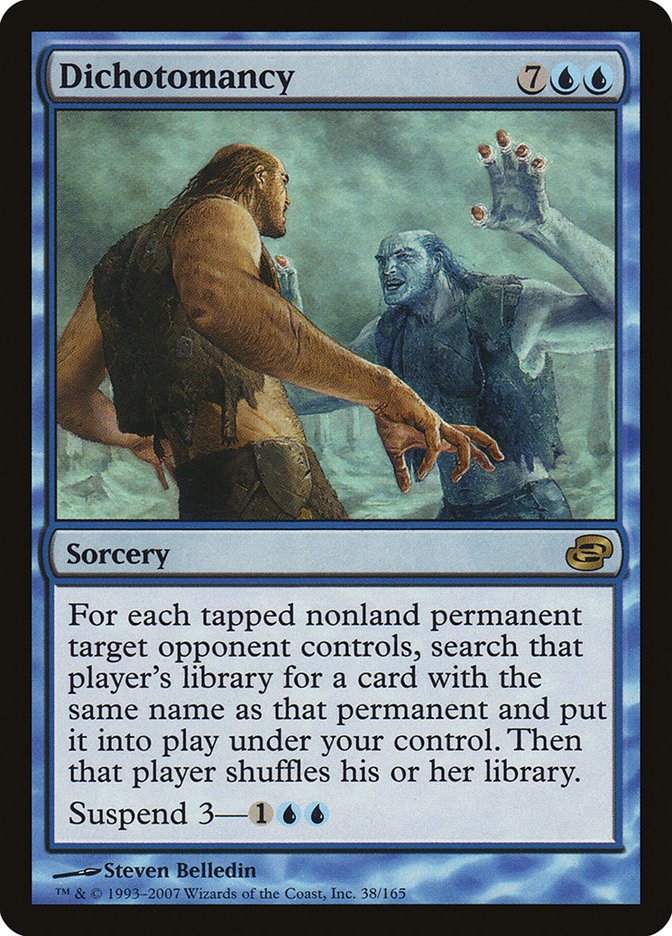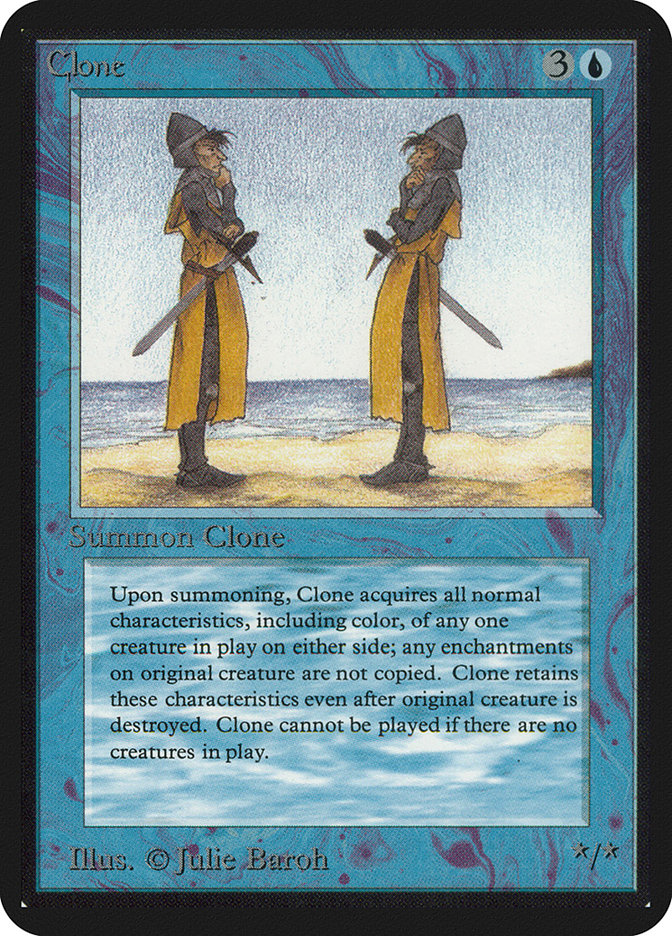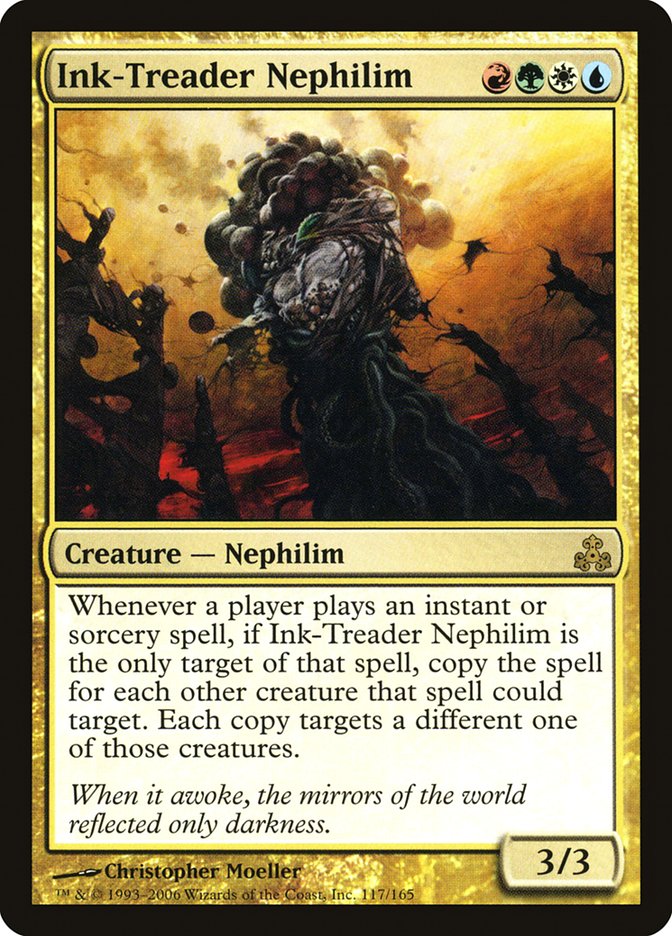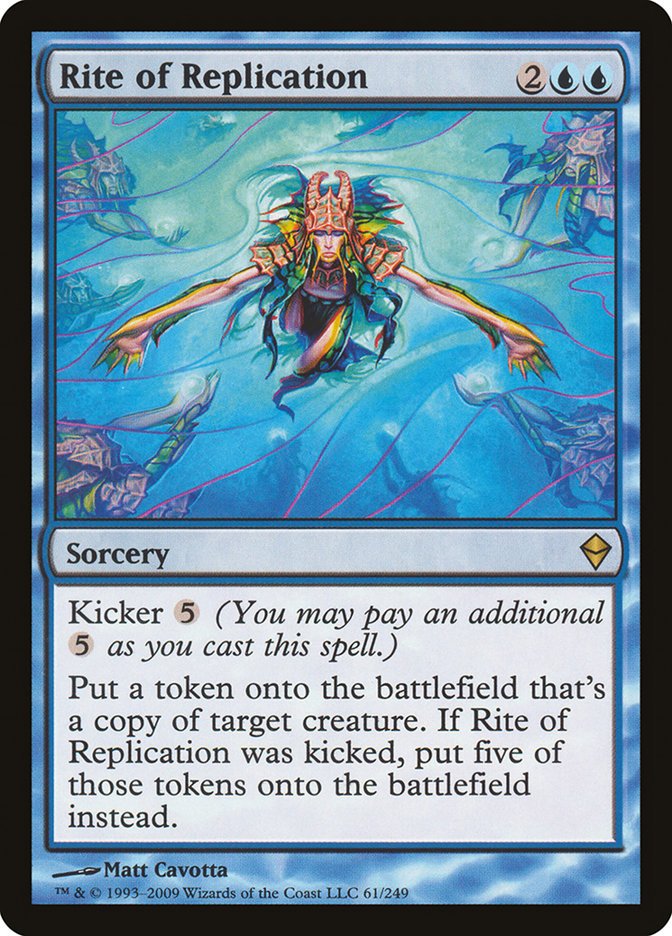Dichotomancy MTG Card
| Mana cost | |
| Converted mana cost | 9 |
| Rarity | Rare |
| Type | Sorcery |
| Abilities | Suspend |
| Released | 2007-02-02 |
| Set symbol | |
| Set name | Planar Chaos |
| Set code | PLC |
| Number | 38 |
| Frame | 2003 |
| Layout | Normal |
| Border | Black |
| Illustred by | Steven Belledin |
Text of card
For each tapped nonland permanent target opponent controls, search that player's library for a card with the same name as that permanent and put it into play under your control. Then that player shuffles his or her library. Suspend 3—
Cards like Dichotomancy
Dichotomancy from the Planar Chaos set carved its niche in Magic: The Gathering with its unique ability to duplicate your opponent’s creatures. Unlike Clone or other creature-copying spells that target individual creatures, Dichotomancy ramps this concept to a grand scale by cloning several creatures based on the number of tapped permanents your opponent controls. This potential for a massive swell in board presence is counterbalanced by its significant eight-mana cost, high even for effects offering considerable power.
The card mirrors the mechanics of Ink-Treader Nephilim, albeit with a significantly different effect. Ink-Treader Nephilim has the capacity to target all creatures sharing a target’s name for certain spells. However, Dichotomancy’s high mana cost and sorcery speed require a setup that is more calculated compared to the reactive potential of the Nephilim. Then there is Rite of Replication, which, for a hefty nine mana with its kicker cost, can duplicate a single creature five times, offering a different but still explosive avenue for overwhelming an opponent.
Summarizing, Dichotomancy presents a fascinating strategic tool among MTG cards that duplicate creatures. Its potentially massive impact compensates for its high cost, setting the stage for tide-turning plays when used thoughtfully.
Card Pros
Card Advantage: Dichotomancy offers the potential to generate multiple copies of target permanents, effectively increasing the number of resources under your control without depleting your hand.
Resource Acceleration: By cloning your opponent’s mana-generating permanents, Dichotomancy can unexpectedly ramp up your available resources, allowing for more flexibility in your gameplay.
Instant Speed: Though Dichotomancy is a sorcery, its unexpected impact during your turn can feel as though it’s been cast at instant speed, opening up avenues to disrupt opponents’ plans before they can recover on their own turn.
Card Cons
Discard Requirement: Needs a hefty amount of cards in hand to function effectively. If you’re running low on cards, leveraging Dichotomancy’s full potential becomes challenging, as it does not replenish your hand upon execution.
Specific Mana Cost: Dichotomancy’s mana requirement includes three blue mana, which can be restrictive. Decks that aren’t heavily focused on blue mana may find it difficult to accommodate such a color-demanding card.
Comparatively High Mana Cost: With an eight mana spell cost, Dichotomancy sits at the higher end of the mana curve. Many players may prefer spells that have a more immediate impact on the game state for the same, or a lesser, mana investment.
Reasons to Include in Your Collection
Versatility: Dichotomancy offers a unique form of control that can adapt to a wide range of game states. It can disrupt an opponent’s board especially when they rely on copies or token strategies.
Combo Potential: With the right setup, Dichotomancy can turn into a game-changer by seizing a significant number of tokens, setting up potential win conditions or paving the way for high-impact plays.
Meta-Relevance: Given that many decks aim to swarm the board with creatures, Dichotomancy can serve as a counterbalance to such strategies, making it a potent choice for a diverse metagame.
How to beat
Dichotomancy can turn the tides in a Magic: The Gathering match by creating sudden and overwhelming advantage. This sorcery card allows you to return to your hand all permanents that share a color with a target permanent. The best strategy to counteract Dichotomancy’s potential impact is to employ a diverse color spread in your deck. By doing so, you minimize the risk of a single color target enabling a mass retrieval of cards.
Another tactic is to keep instant speed removal or counterspells ready. Disrupting the spell as it’s cast can save your board state from being exploited. Moreover, since Dichotomancy hinges on the number of cards your opponent controls with the same color, limiting the number of permanents on your side or having a lower curve can reduce the card’s effectiveness. Lastly, having cards that grant hexproof to your permanents or to you can prevent Dichotomancy from being a viable option for your opponent’s gameplay.
In summary, when facing Dichotomancy, aim for color diversity, have instant removals at the ready, streamline your board presence, and use hexproof to safeguard your game, strategically nullifying the potential stark threats of this MTG card.
Where to buy
If you're looking to purchase Dichotomancy MTG card by a specific set like Planar Chaos, there are several reliable options to consider. One of the primary sources is your local game store, where you can often find booster packs, individual cards, and preconstructed decks from current and some past sets. They often offer the added benefit of a community where you can trade with other players.
For a broader inventory, particularly of older sets, online marketplaces like TCGPlayer, Card Kingdom and Card Market offer extensive selections and allow you to search for cards from specific sets. Larger e-commerce platforms like eBay and Amazon also have listings from various sellers, which can be a good place to look for sealed product and rare finds.
Additionally, Magic’s official site often has a store locator and retailer lists for finding Wizards of the Coast licensed products. Remember to check for authenticity and the condition of the cards when purchasing, especially from individual sellers on larger marketplaces.
Below is a list of some store websites where you can buy the Dichotomancy and other MTG cards:
 BUY NOW
BUY NOW BurnMana is an official partner of TCGPlayer
- eBay
- Card Kingdom
- Card Market
- Star City Games
- CoolStuffInc
- MTG Mint Card
- Hareruya
- Troll and Toad
- ABU Games
- Card Hoarder Magic Online
- MTGO Traders Magic Online
See MTG Products
Legalities
Magic the Gathering formats where Dichotomancy has restrictions
| Format | Legality |
|---|---|
| Commander | Legal |
| Legacy | Legal |
| Modern | Legal |
| Oathbreaker | Legal |
| Vintage | Legal |
| Duel | Legal |
| Predh | Legal |
| Penny | Legal |
Rules and information
The reference guide for Magic: The Gathering Dichotomancy card rulings provides official rulings, any errata issued, as well as a record of all the functional modifications that have occurred.
| Date | Text |
|---|---|
| 2007-02-01 | The cards all enter the battlefield simultaneously. If one of the cards that’s entering the battlefield is an Aura, it must enter the battlefield attached to a permanent already on the battlefield. It can’t enter the battlefield attached to another permanent entering the battlefield via Dichotomancy. If an Aura can’t enter the battlefield this way, it remains in the opponent’s library. |
| 2021-06-18 | As the second triggered ability resolves, you must cast the card if able. You must do so even if it requires targets and the only legal targets are ones that you really don’t want to target. Timing permissions based on the card’s type are ignored. |
| 2021-06-18 | Cards exiled with suspend are exiled face up. |
| 2021-06-18 | Exiling a card with suspend isn’t casting that card. This action doesn’t use the stack and can’t be responded to. |
| 2021-06-18 | If an effect refers to a “suspended card,” that means a card that (1) has suspend, (2) is in exile, and (3) has one or more time counters on it. |
| 2021-06-18 | If the card has in its mana cost, you must choose 0 as the value of X when casting it without paying its mana cost. |
| 2021-06-18 | If the first triggered ability of suspend (the one that removes time counters) is countered, no time counter is removed. The ability will trigger again at the beginning of the card’s owner’s next upkeep. |
| 2021-06-18 | If the second triggered ability is countered, the card can’t be cast. It remains exiled with no time counters on it, and it’s no longer suspended. |
| 2021-06-18 | If the spell requires any targets, those targets are chosen when the spell is finally cast, not when it’s exiled. |
| 2021-06-18 | If you can’t cast the card, perhaps because there are no legal targets available, it remains exiled with no time counters on it, and it’s no longer suspended. |
| 2021-06-18 | If you cast a card “without paying its mana cost,” such as with suspend, you can’t choose to cast it for any alternative costs. You can, however, pay additional costs. If the card has any mandatory additional costs, you must pay those if you want to cast the card. |
| 2021-06-18 | Suspend is a keyword that represents three abilities. The first is a static ability that allows you to exile the card from your hand with the specified number of time counters (the number before the dash) on it by paying its suspend cost (listed after the dash). The second is a triggered ability that removes a time counter from the suspended card at the beginning of each of your upkeeps. The third is a triggered ability that causes you to cast the card when the last time counter is removed. If you cast a creature spell this way, it gains haste until you lose control of that creature (or, in rare cases, you lose control of the creature spell while it’s on the stack). |
| 2021-06-18 | The mana value of a spell cast without paying its mana cost is determined by its mana cost, even though that cost wasn’t paid. |
| 2021-06-18 | When the last time counter is removed, the second triggered ability of suspend (the one that lets you cast the card) triggers. It doesn’t matter why the last time counter was removed or what effect removed it. |
| 2021-06-18 | You are never forced to activate mana abilities to pay costs, so if there is a mandatory additional mana cost (such as from Thalia, Guardian of Thraben), you can decline to activate mana abilities to pay for it and hence fail to cast the suspended card, leaving it in exile. |
| 2021-06-18 | You can exile a card in your hand using suspend any time you could cast that card. Consider its card type, any effects that modify when you could cast it (such as flash) and any other effects that stop you from casting it (such as from Meddling Mage’s ability) to determine if and when you can do this. Whether you could actually complete all steps in casting the card is irrelevant. For example, you can exile a card with suspend that has no mana cost or that requires a target even if no legal targets are available at that time. |



